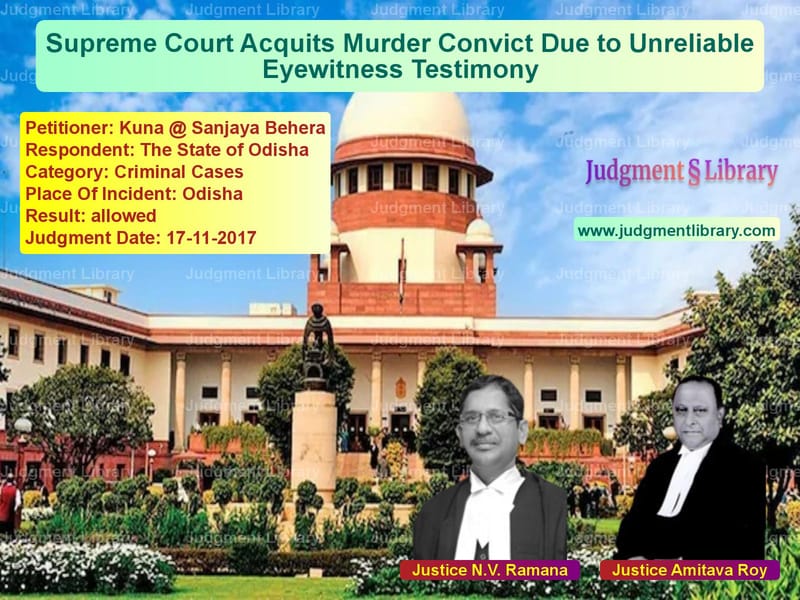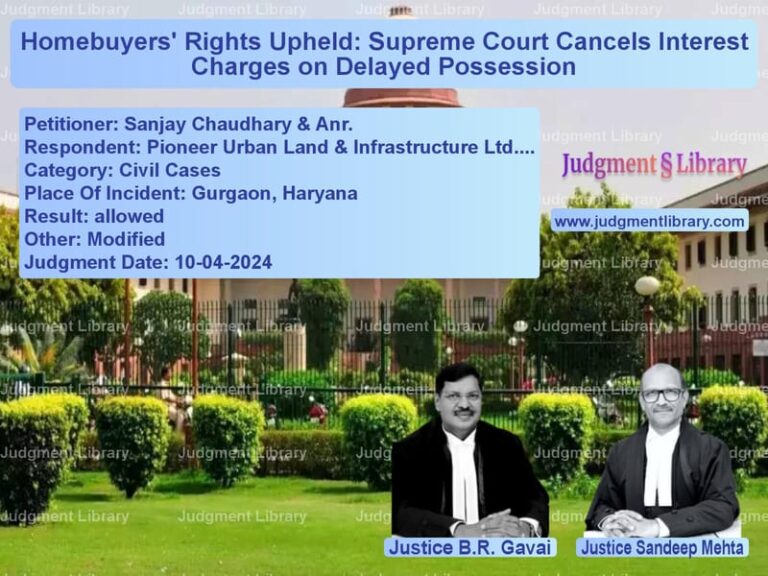Supreme Court Acquits Murder Convict Due to Unreliable Eyewitness Testimony
The case of Kuna @ Sanjaya Behera vs. The State of Odisha is a significant example of how the reliability of an eyewitness testimony plays a crucial role in the judicial system. The case revolves around a criminal appeal in which the appellant, along with a co-accused, was convicted for murder under Section 302 IPC read with Section 34 IPC. The Supreme Court, after a thorough examination of the facts, overturned the conviction, citing inconsistencies and improbabilities in the prosecution’s case.
The appellant was initially convicted by the Trial Court based on the testimony of PW1, who claimed to have witnessed the crime. The High Court upheld this conviction. However, upon appeal to the Supreme Court, the reliability of PW1’s testimony was scrutinized in depth, leading to the acquittal of the appellant.
Background of the Case
The case began on February 20, 2000, when PW12, Premananda Behera, lodged a report with the police regarding the unnatural death of his brother, Santosh Behera. According to the initial report, Santosh Behera was found hanging from the roof of a shed adjacent to his house, suggesting suicide. However, the investigation took a different turn when PW1, Niranjan Behera, came forward and claimed that the deceased was actually murdered by the appellant, Kuna @ Sanjaya Behera, along with the co-accused Pravati Behera.
Trial Court Proceedings
The prosecution relied heavily on the testimony of PW1, who stated that he had witnessed the murder. According to him, the appellant and the co-accused strangled the deceased and later hanged his body to make it appear as a suicide. Based on this testimony and the medical evidence, which confirmed asphyxia as the cause of death, the Trial Court convicted the accused under Section 302/34 IPC and sentenced them to life imprisonment.
High Court’s Decision
The High Court upheld the conviction, placing strong reliance on PW1’s testimony. It also noted that the alleged motive for the crime was an illicit relationship between the accused. The High Court accepted the prosecution’s argument that the delay in filing the FIR was due to the appellant’s threats to PW1. The judgment emphasized that a single witness’s testimony, if found reliable, is sufficient for conviction.
Petitioner’s Arguments in Supreme Court
Representing the appellant, senior counsel Mr. Krishnan Venugopal strongly argued against the credibility of PW1’s testimony, raising several points:
- PW1 remained silent for three days despite allegedly witnessing a murder.
- The alleged incident took place in a poorly lit area, making it unlikely for PW1 to have observed it clearly.
- PW1 was intoxicated at the time, which could have impaired his perception.
- The delay of six days in registering the FIR cast serious doubts on the credibility of the prosecution’s case.
- Despite the presence of multiple houses nearby, PW1 did not raise an alarm or seek help.
- The prosecution failed to establish a concrete motive for the murder.
Respondent’s Counterarguments
The State, represented by Mr. Shibashish Misra, defended the conviction on the following grounds:
- PW1’s testimony was consistent and corroborated by medical evidence.
- His delay in reporting was justified as he was threatened by the appellant.
- The post-mortem report confirmed that the death was due to strangulation and not hanging.
- PW3, the mother of the deceased, had testified about the accused’s illicit relationship, supporting the prosecution’s theory of motive.
Supreme Court’s Analysis
The Supreme Court, led by Justices N.V. Ramana and Amitava Roy, found serious inconsistencies in the prosecution’s case:
- PW1’s version was filled with improbabilities and contradictions.
- The absence of sufficient lighting made it doubtful whether PW1 could have seen the crime.
- The prosecution failed to conclusively establish the alleged illicit relationship as a motive.
- The delay in filing the FIR was not satisfactorily explained.
- Despite the proximity of other houses, no other independent witness corroborated PW1’s claim.
Final Judgment
The Supreme Court ruled that the prosecution had failed to prove the case beyond a reasonable doubt. The appeal was allowed, and the appellant was acquitted.
“The evidence of PW1, as a witness of incident of murder, as projected by him, is wholly unacceptable being fraught with improbabilities, doubts, and oddities inconceivable with normal human conduct or behavior and, thus, cannot be acted upon as the basis of conviction.”
The Supreme Court held that the Trial Court and the High Court had erred in relying on PW1’s testimony despite its glaring inconsistencies. It concluded that the accused should be released unless required in any other case.
Don’t miss out on the full details! Download the complete judgment in PDF format below and gain valuable insights instantly!
Download Judgment: Kuna @ Sanjaya Beher vs The State of Odisha Supreme Court of India Judgment Dated 17-11-2017.pdf
Direct Downlaod Judgment: Direct downlaod this Judgment
See all petitions in Murder Cases
See all petitions in Bail and Anticipatory Bail
See all petitions in Judgment by N.V. Ramana
See all petitions in Judgment by Amitava Roy
See all petitions in allowed
See all petitions in supreme court of India judgments November 2017
See all petitions in 2017 judgments
See all posts in Criminal Cases Category
See all allowed petitions in Criminal Cases Category
See all Dismissed petitions in Criminal Cases Category
See all partially allowed petitions in Criminal Cases Category







